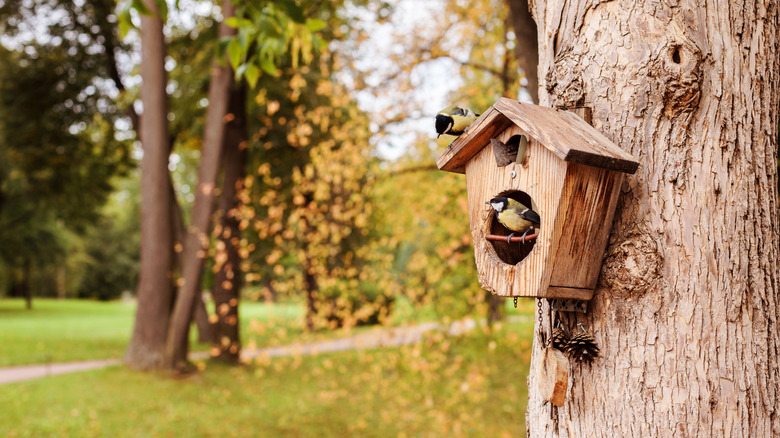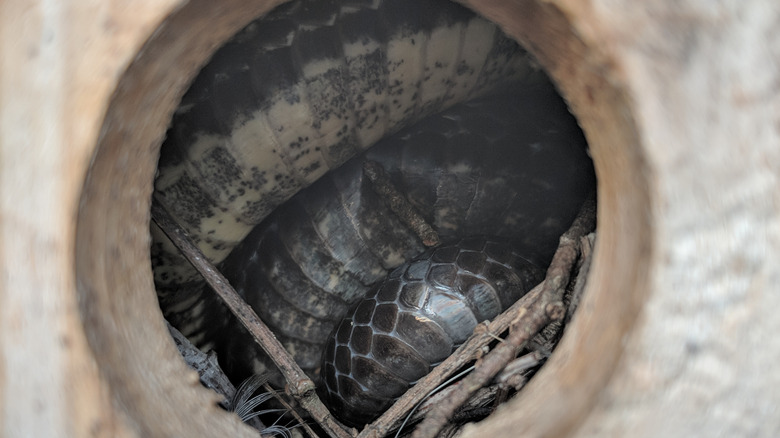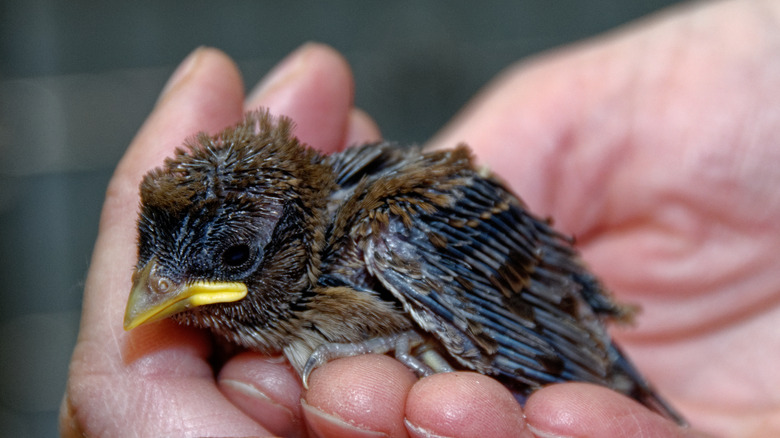Bird-Watching Pros Don't Put Seeds In Their Birdhouses; Here's Why
It's taken you all winter to make a charming birdhouse. At the first signs of spring, you nail it to a tree and wait, and wait ... and wait. No birds take up residence, and you're left disappointed. Perhaps I'll put some birdseed in there to attract a bird or two, you think to yourself. While this seems like a smart idea, bird pros tend to disagree. Birdseed attracts predators, and if it gets wet, it can go moldy, encouraging disease.
The potential for attracting predators is what causes most bird watchers to hesitate to recommend birdseed in nesting boxes. "By placing bird feed in the birdhouse, you will be inviting unwanted predators such as squirrels, rats, and snakes who will explore the smells of food," writes Justin Chia, founder and author of Birding Outdoors. What's more, small mammals might take up residence in empty birdhouses filled with seeds, discouraging birds from nesting there altogether. Speaking to Martha Stewart, Audubon's Plants for Birds partnership manager Marlene Pantin agrees: "Fallen seeds can attract other animals."
Birdseed near nesting boxes is a bad idea
Even leaving seeds next to or near a nest can be an issue. When a Quora member questioned whether leaving birdseed near a nest was a good idea, the response was a unanimous no. Ethology graduate, fantasy author, and long-time bird enthusiast Mercedes R. Lackey suggested leaving the feed somewhere in the bird's line of vision but not close enough to the next to draw the attention of other animals. "It can attract other birds, which might interfere with her sitting on the eggs, predators, and insects," she wrote. Bird watcher and photographer Sage Kadow agrees: "Going near the nest could stress the mother and cause her to abandon the nest ... She will not need to be fed by humans at this point."
In 2016, researchers at the University of Reading published evidence that feeding birds close to their nests resulted in increased predator attacks. As a result, they recommended keeping food away from nests altogether. Leading U.K. birdseed provider Kennedy Wild Bird Food echoes their statement. "It is during the nesting season that birds are at their most vulnerable," they write on their website. "Any disturbances to their nest could cause the parent birds to abandon their nest, leaving the young at huge risk."
Spoiled seeds can be deadly
Spoilage is another unwanted outcome of seeds in a nest box. "Adding seeds to the interior of a wooden birdhouse will only see them rot," writes Nicholas Vaughan, founder of the backyard bird-focused blog, Wildlifeful. The smell and mold, he continues, stick around for a long time, resulting in a pretty nasty fly problem. Not an attractive proposition for most birds looking for an ideal nesting spot!
Moldy or contaminated seed spreads disease, and chicks, with their underdeveloped immune systems, are particularly vulnerable. "Birds that feed on these contaminated seeds can become sick and even die," notes backyard wildlife expert Terry W. Johnson in an article for the Wildlife Resources Division of the Georgia Department of Natural Resources on bird feeding problems. Some diseases common to spoiled birdseed include aspergillosis, salmonella, finch disease, avian trichomoniasis, and avian pox.
It's not just a matter of knowing the best way to clean a birdhouse. It turns out that the birdseed you buy from a pet store is often found to have high levels of aflatoxins (a family of mycotoxins created by certain types of fungi) when tested. "The possibility that garden birds are being exposed to mycotoxins through the use of provisioned foods" is an area that urgently needs more research, says Dr. Kate Plummer, Senior Research Ecologist at the British Trust for Ornithology.


